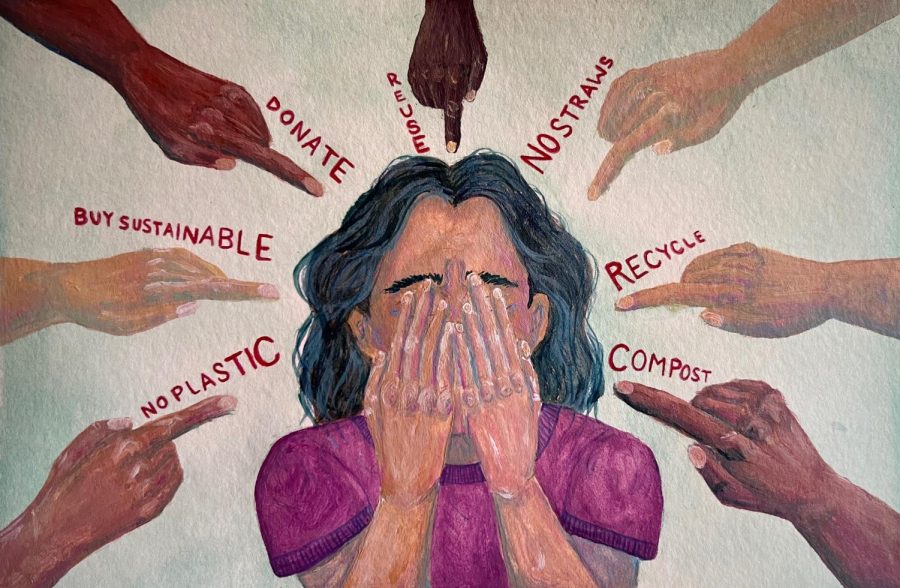Environmentalism: Where imperfect is the new perfect
September 29, 2022
Surrounded by a world experiencing climate change at a rapid and unnatural rate, it is only human that we want to be superheroes.
All around us are scary facts about the piles of waste in the oceans and zero-waste influencers on TikTok that have all the trash they’ve produced in the last 10 years in a 12-ounce mason jar.
As you walk into a store, you likely see an abundance of different products claiming they are locally-grown, made from compostable material or made with sustainably-grown cotton. These kinds of products seem like the best option for you and the planet, until you see the price tag.
At the beginning of my “environmental journey,” I wanted to do it all. I would use all my glass containers, always drink from my reusable bottle, bring utensils everywhere, compost and buy only thrifted clothes and unpackaged items.
The problem: I lived in an apartment with no backyard for composting. Buying all that sustainable gear was expensive and, being in a global pandemic, food supplied in bulk without packaging wasn’t really an option.
The idea of sustainability I adopted unrealistically expects zero-waste living in a capitalist world. The collective effort needed to preserve this Earth is not, in reality, something that can be solved by a single individual buying commercially-marketed products or adhering to a stringent lifestyle.
“It starts to turn into consumerism and not waste reduction,” said Eco-Reps Program Coordinator Caylin McCamp. “It can lose its original purpose and make people feel that they need a certain amount of income to be participating in something like that.”
Perfect zero-waste living seems fool-proof in theory, but not in practice. We live in a world where being completely zero-waste and exclusively choosing sustainable options isn’t always possible due to our budget, current resources or our lifestyles in general.
As I dove deeper into research, I realized my efforts would be in no way sufficient to undo the carbon footprint of huge corporations. My use of a reusable fork certainly won’t reverse the effects of Jeff Bezos and his supporters.
“Even if you reduce your impact to not existing it just wouldn’t be enough,” McCamp said. “One person being perfect is never going to be enough.”
After my anxiety-inducing and belittling attempt at being an “environmentalist,” I stumbled across the concept of Imperfect Environmentalism.
“Imperfect Environmentalism” was coined in author Sara Gilbert’s 2013 book, “The Imperfect Environmentalist.”
The book expresses that it is unrealistic to be completely sustainable but that every person can integrate small habits into their life that contributes to a more sustainable world.
“There have been weeks when I didn’t recycle–but then I did use a hippie cleaning product to clean my kitchen,” Gilbert stated in her book. “It’s about doing what we can when we can and empowering ourselves to make a difference.”
Eventually, I realized I didn’t need the expensive, sustainably-manufactured clothes or to have a plethora of refillable and plastic-free products or to completely stop using plastic bags.
Instead, I now try to use glass containers I already have, incorporate more plant-based foods into my diet and buy unpackaged produce when it is available.
These sustainable habits don’t have to be Earth-shattering, no pun intended. You could begin by using a reusable water bottle, doing “meatless Mondays” or choosing to get your receipt emailed instead of printed.
It is also important to note that as individuals, we can “vote with our dollar,” meaning that because our money sustains large corporations, where we channel it ultimately leads to the evolution of sustainable practices in large businesses.
“[I have the] knowledge that many of us are doing what feels possible right now and that we can always do better,” stated Elizabeth Palchak, Director of the Office of Sustainability, in an email. “I’m most interested in what each of us is doing to be part of the solution.”
Imperfect Environmentalism helped me adopt a mindset of making small changes in my daily routine that could lead to a more sustainable tomorrow.
Environmentalism doesn’t have to be an unattainable lifestyle, it can be normalized in small, everyday actions. With everyone practicing environmentalism in a way that is manageable to them, hopefully the practices of large corporations will begin to change as well.
We don’t need to bring our own utensils to our uncle’s cookout, but we can bring our own tumbler next time we get coffee. We can use our Tupperware while adding to our knowledge of sustainability rather than adhering to practices like avoiding palm oil at all costs.
We need to be content with imperfection, because after all, society-wide progress is what will slow the rate of climate change and waste production, not just using toothpaste with plastic-free tubes.
